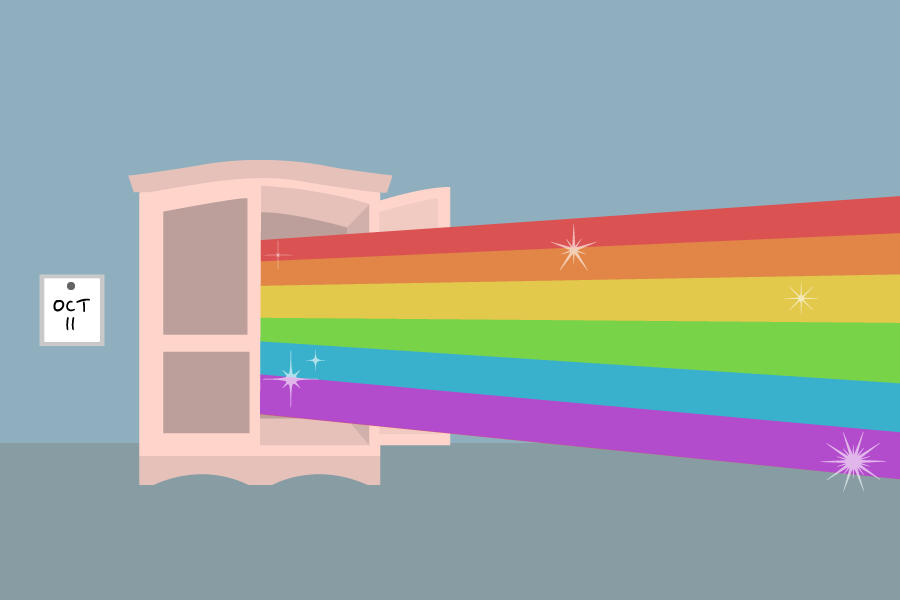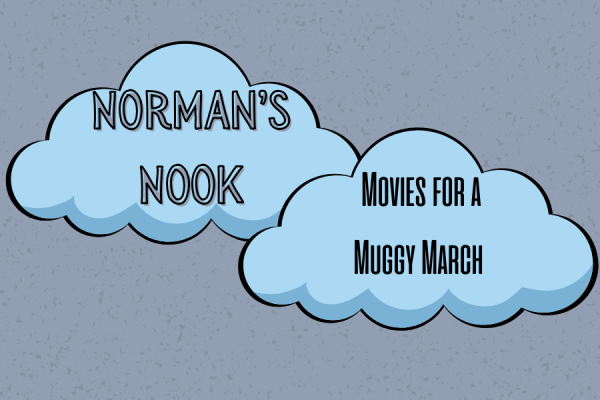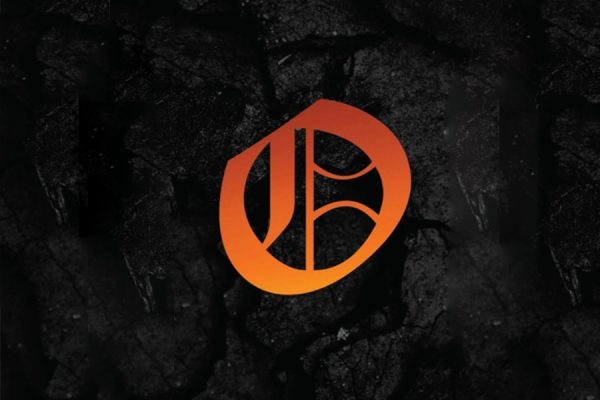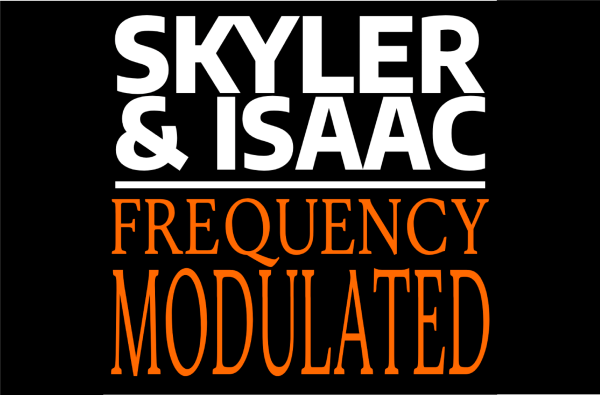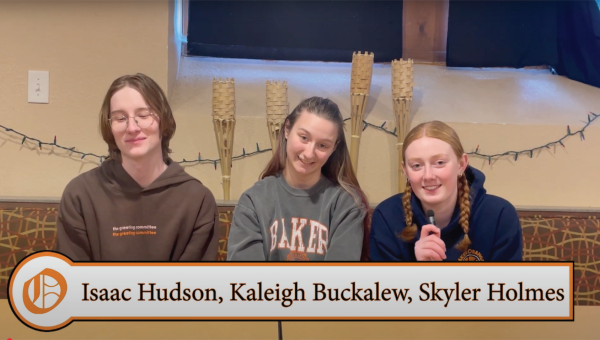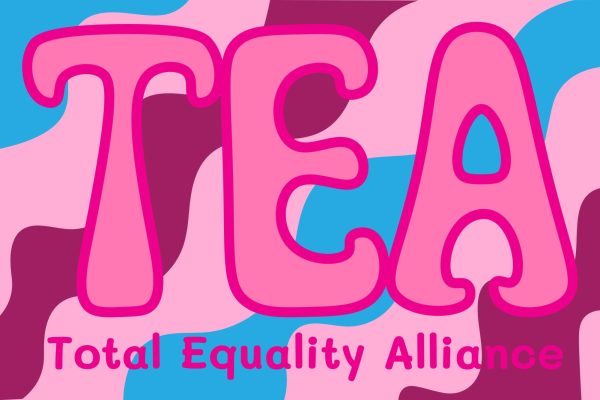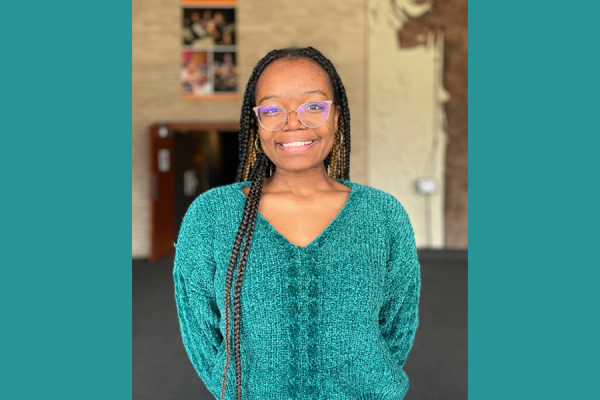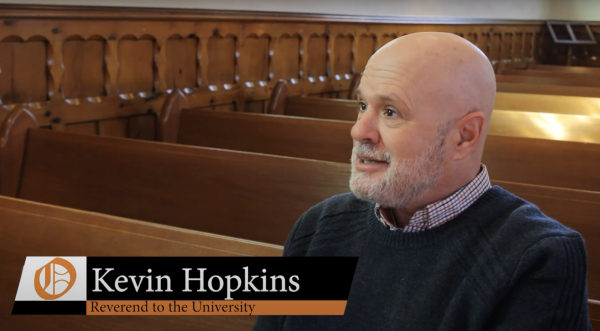The pressure of coming out
Oct. 11 marks National Coming Out day, a day significant to many of those in LGBTQIA+ community.
Before I realized that I was queer, I was enthralled by anything to do with the LGBTQIA+ community. In middle school, I became obsessed with a handful of queer creators on YouTube like Tyler Oakley, Ingrid Nilsen and Connor Franta. I can remember spending countless hours watching coming-out videos from YouTubers big and small.
On May 16, 2015, I got a YouTube alert on my iPod Touch. Creator Joey Graceffa released his “Don’t Wait” music video in which he came out as gay. I watched the video, entirely entranced. The video followed the story of a young boy growing up and realizing he was different, culminating in a kiss with another man at the end. It would be a while before I realized why videos like this made me so emotional.
I think it is important to talk about coming out, especially with National Coming Out Day on October 11. Even though we have marriage equality and strong representation in the media, coming out is still really hard.
In around seventh grade, I realized that I liked girls. I started to admit to some of my closest friends that I wasn’t straight. For the next several years, up until my senior year of high school, the labels I identified with fluctuated. Bi, pan, gay, queer, lesbian; I always felt like there were so many options and that was so daunting. I told myself that I couldn’t be out until I knew exactly what word described who I was. For many people that come out using one label, then decide that a different label fits them better, there can be repercussions. In many cases, people may accuse them of coming out as queer for attention.
During my senior year of high school, I started dating my girlfriend. At this point, I knew that I had to come out to anyone that didn’t know. I could not keep my identity a secret when my relationship started to get serious.
The first and hardest thing to do was come out to my mom. For a lot of people, coming out to their parents seems like an insurmountable decision because coming out to unsupportive parents can be physically or mentally unsafe.
Queer youth may face emotional and/or physical abuse from homophobic parents. Some parents even disown their queer kids or leave them homeless. I knew that my mom would be supportive, which made fears of secretly disappointing her so much worse. Even though I knew my mom would be supportive, it didn’t change that I felt like I was doing something wrong.
In January, I told my mom about my relationship. I told her that my “friend” was actually my girlfriend and, as I expected, my mom was more than accepting. What she actually said when I told her was, “I’m not stupid, Hunter.” We were able to laugh and hug because I was doing a bad job hiding my excitement about my relationship, but I was lucky.
Later, I told my stepdad, my grandparents, my aunts and anyone else that would ever need or want to know that I was dating someone. They were all supportive of my relationship, but I couldn’t shake the feeling that I was disappointing or inconveniencing them.
I am grateful to come from a supportive and accepting family, friend group and community. But even though my own situation is good, I recognize that coming out can be one of the scariest things that queer people can do. Coming out is hard, even when the person you’re coming out to is yourself. Society doesn’t make that any easier, either.
I’ve always gotten the feeling that some people feel like they can’t come out because it’s “too late.” Compulsory heterosexuality, or “comp het”, means assuming you’re straight because heterosexuality is seen as the norm. It’s something that leads to a lot of queer people not realizing that they are queer until later in life.
Additionally, internal and external homophobia make it scary for a lot of people to admit to themselves and the world around them that they aren’t straight. Queer people are often criticized in the media and in social situations.
Religion and cultural values may discourage or outright ban homosexuality. These factors make some people feel shame for their own queer identities alongside the physical and verbal homophobic attacks that many queer people face.
In my own experience, I experienced feelings of compulsory heterosexuality. Looking back on my “boy crazy” days in elementary and middle school, I randomly picked male classmates to convince myself and my friends that I had “crushes” on them. In addition to my experience with comp het, I felt pressure from society to have a concrete label for my sexuality in order to feel like coming out was justified.
I currently use the terms gay, lesbian and queer interchangeably to refer to myself, but I spent years feeling like I needed to stick to just one, which restricted me from coming out until I felt like I had no other choice. Even with a supportive group of people around me, I still experience some internalized homophobia. Those feelings that who I am is wrong or disappointing comes from a lot of negative rhetoric about queer identities present in our world.
I am out. I am proud. For many people, however, coming out is not an option. Being proud can be extremely dangerous or just mildly uncomfortable. National Coming Out Day is exciting and deserves to be celebrated. But no one should feel pressured to come out on Oct. 11 or any day, unless they are ready.
If you or someone you know is struggling, The Trevor Project offers help 24/7. For more information about LGBTQIA+ inclusion and representation, visit GLAAD. For more information about how to be an ally, visit PFLAG.
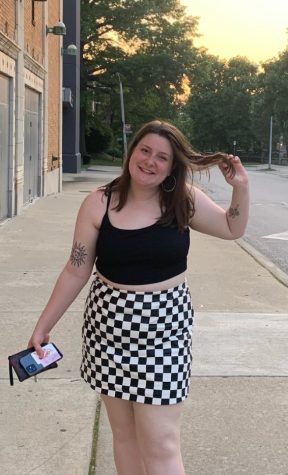
Hunter is a freshman from Shawnee, Kansas. She is a sociology major with a minor in social justice. She is a member of Mungano and the SAC Cultural and...


